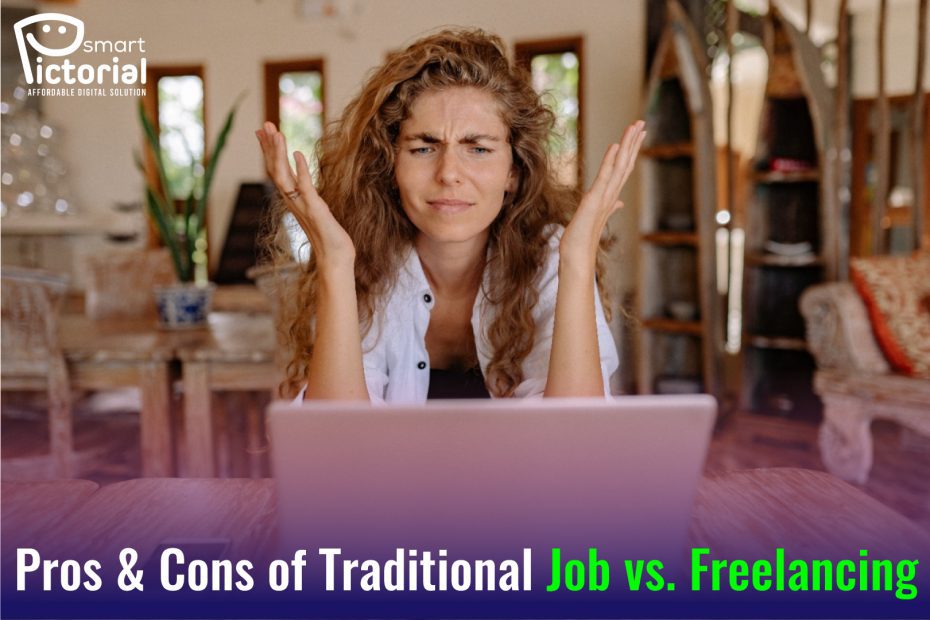If you’re looking to become your own boss and are thinking about making the leap from traditional jobs to freelancing, or if you’re already freelancing but are wondering whether you should take the next step and look for a job, this article will go over the differences between these two career paths (Traditional Job vs. Freelancing) so that you can decide which one would be right for you.
Building your portfolio
As a freelancer, you’ll be judged on your portfolio—so you want to make sure it showcases your strongest work. Make sure to update it regularly with examples of your latest projects; you never know when that might come in handy during an interview or even on your next freelance job. There are many ways to build up a portfolio, such as creating YouTube videos, blogging, recording podcasts, making photo slideshows, and more! Think about what would fit into your strengths: Do you like writing? Consider doing guest posts for other blogs. Enjoy photography? Start a Flickr account where you can showcase your best shots. The possibilities are endless!
Networking
The main advantage that most freelancers have over their full-time counterparts is flexibility: they can take time off when they need it, travel when they want to, and work from anywhere with an Internet connection—usually in much nicer environments than their cubicles back at work. But there are other advantages as well. For example, freelancers don’t have to deal with office politics or wait for someone else to give them permission to take on new projects; if they see something interesting on Upwork or Fiverr (or even LinkedIn), they can go after it right away without having to check in with anyone first.
Managing Projects
Having multiple projects to complete can be overwhelming, especially when there are deadlines involved. This is why it’s important to manage your time properly so you’re not stressed out by work. Creating an organized environment for yourself can also help with stress management, making it easier to get work done without having too much pressure on yourself. Here are some tips that will help you stay productive: 1. Create a list of all your tasks, big or small. If you have too many items on your list, try prioritizing them into must-do tasks and would-be-nice-to-do tasks. The must-do tasks should be completed before anything else—it doesn’t matter if they take up most of your day—they need to get done before anything else does!
Recurring Income Streams
What’s more, people who work for themselves often earn more than their counterparts with traditional jobs. Several studies show that freelancers make an average of $600 more per month than salaried employees—and they take home two to three times as much as contract workers. That’s because many companies are willing to pay higher rates when hiring independent contractors rather than full-time staff members. As one freelancer put it: I can be paid well without having my time managed by someone else.
No Set Schedule
One major drawback to freelancing is that it’s completely up to you as to when you work—which means there’s no set schedule, and could potentially lead to burnout. It’s easy for freelancers to get so caught up in the work that they wind up working all hours of the day, night after night. This can be dangerous for your health and productivity, not to mention your personal life. And if you do have a family or other obligations outside of work, it can be hard to find time for them with no set schedule. That said, some people love being able to decide what time they start their day; others prefer knowing exactly what time they need to be at work each morning (and being able to leave at 5 pm). You’ll have to figure out which camp you fall into!
Keeping Clients Happy
In an industry that is so talent-based, clients can be all too aware that they could get anyone to do what you’re doing. They may want to call in favors or sweeten your deal, but don’t let them pressure you into accepting anything less than what you deserve. Tell them that you love their company, but if they won’t pay your rate, they can always find someone else who will. If they still push back, walk away from the job. It’s better to lose one client than it is to lower your rates for everyone.
Knowing What To Charge
One major benefit of freelancing is that you get to set your own rates, so before you make any commitments, consider what your skills are worth. As a general rule, freelancers tend to undervalue their work because they don’t want clients to think their rates are too high or seem ungrateful for their customers’ business. Don’t fall into that trap—it will only hurt you in the long run. Once you determine how much value your services provide, it will be easier to figure out what kind of pay rate makes sense for both parties involved.
The burden of taxes
Taxes are not just an annoyance; they’re often an expensive burden that takes money out of your paycheck, even if you aren’t making much, to begin with.
Employment benefits of a traditional job
If you don’t like the idea of working from home or not being able to travel, a traditional job might be the way to go for you. However, with all the options out there today, it can be hard to choose which one will work best for you and your life goals. This list of employee benefits can help you decide whether an old-fashioned career path is right for you.
1. Health insurance
A lot of people go without health insurance, either because they can’t afford it or because they don’t want to spend their hard-earned cash on something so unglamorous. Health insurance offers peace of mind and protection against major illness or injury. It’s an important factor to consider when deciding between a traditional job and freelancing. On one hand, you have more flexibility with freelance work and there’s no cap on how much you can earn. But if you get sick or hurt, you might be stuck footing your own medical bills. When it comes down to it, only you can decide which option is best for your situation—but make sure to weigh all of your options before making a decision.
2. Vacation time
When you work for yourself, you can schedule your hours pretty much however you want—but when you’re employed full-time, there are certain rights that come with it. Vacation time is one of those perks. Asking for vacation time from your boss may be awkward or even scary, but if you make it clear that your commitment to do good work will still be there after some time off, they should understand. And hey, in case you were wondering: yes, people do get fired for taking too many days off! Just remember that taking time away from work isn’t always bad; in fact, studies have shown that people who take vacations tend to be more productive and happier at their jobs overall.
3. Time off
One big benefit of working for someone else is that you get paid when you’re on vacation. When you work for yourself, however, freelancing or consulting, you may be out of luck in terms of getting paid when you’re not at your desk. If staying home with your kids full-time is an option for you and your family, then great!
4. Work-life balance
While on one hand, having a boss to tell you what to do and when can be helpful in keeping you on task, working for someone else doesn’t leave much room for work-life balance. When it comes to employment benefits, consider whether or not that lifestyle fits your priorities. If it does, take some time to understand why you want an actual full-time career—or if freelancing is better suited for your lifestyle. Understanding which type of position works best for you will help inform future decisions about which benefits are most important. For example, if flexibility is key to your success, then health insurance may not be as important as being able to choose your own schedule. The answer isn’t always obvious (and likely varies from person to person), but understanding where each option excels will help you make an informed decision about how best to handle employment benefits moving forward.











